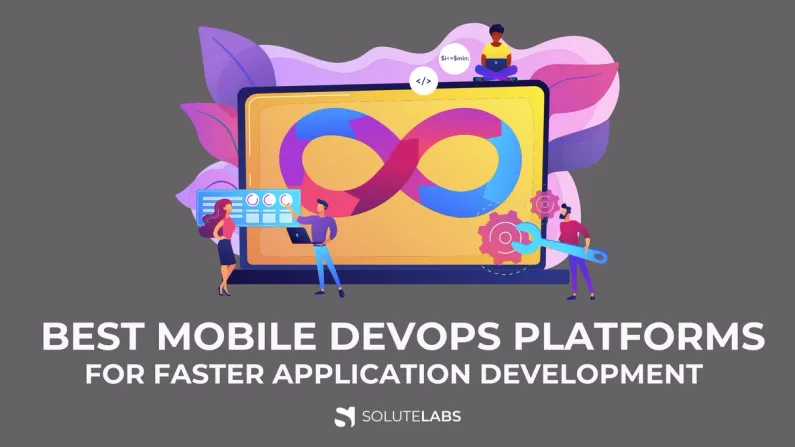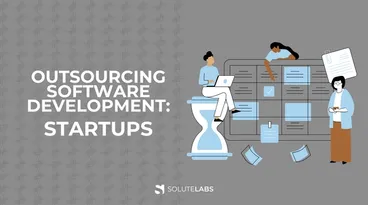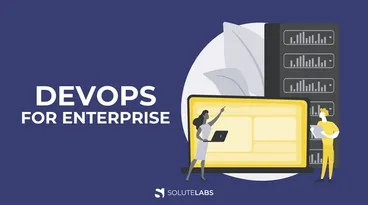The billion-dollar success of numerous mobile applications has made it standard for businesses of all sizes to experiment with app development. However, developing advanced apps is not without its challenges.
It would be best if you had a DevOps team as a partner in your mission. From selecting a suitable architecture for development to creating an original and worthwhile app, everything requires technological expertise. After all, in today's world of advanced technologies, conventional methods of operation are woefully inadequate.
Mobile DevOps platforms come in very handy there. Let us look at some practical mobile DevOps systems that may turbocharge your application development.
What is DevOps for Mobile App Development?
DevOps increases the efficiency of mobile applications. It frees up developers to concentrate on making excellent products rather than fixing infrastructure or scalability problems after they go live. The goal of mobile DevOps is to fully automate the entire process of app development, from requirement analysis and design to implementation and monitoring. With this method, you may meet user and corporate objectives for high-quality applications in record time.
Compared to traditional approaches, when bigger chunks of code are deployed less frequently, DevOps for mobile app development strategies enhance the deployment frequency. By automating the deployment cycle, teams can release new versions more quickly and respond to user input more effectively.
Another difficulty for developers is keeping abreast with the many diverse tools and procedures for various projects, platforms, programming languages, etc. To combat this problem, mobile DevOps practices automate as many of the repetitive manual tasks as possible. It introduces infrastructures that simplify monitoring the status of any software's source code, configuration, script, or document. This is regardless of the platform it was initially developed on. The more streamlined a process is, the easier it is for teams to embrace new tools, and the more time and energy are freed up for app development.
Adopting mobile DevOps platforms requires incorporating key features to unify the process and yield high-quality outcomes.
Top-Rated Mobile DevOps Platforms for Developing and Maintaining Mobile Applications
Here are some top-rated DevOps platforms that can help build powerful mobile apps:
1. AppCircle
In the realm of mobile app development, AppCircle is among the most well-known mobile DevOps platforms. It provides a powerful continuous integration and continuous delivery (CI/CD) environment with drag-and-drop processes for creating, testing, and releasing mobile apps to app stores. Additionally, it provides a wide variety of integrations to help speed up the development of your apps.
It supports various popular building frameworks:
- Platform-based native (Objective-C/Swift Java/Kotlin)
- Cross-platform native (React Native, Flutter and Smartface).
To try out AppCircle, you can sign up for their free individual plan. In a matter of seconds, you may have an app ready for testing and release for iOS, Android, React Native, or Flutter.
2. Codemagic
In a survey for Flutter developers, Codemagic has been named the best continuous integration/continuous delivery solution because of its focus on portability. Create apps for Android, iOS, the web, and desktop using a single Flutter codebase and configure your builds via the UI using the very flexible codemagic.yaml file. By automating the build, testing, and release processes, Codemagic allows teams to focus on creating their product rather than juggling administrative tasks.
Codemagic simplifies React Native app testing on simulators, emulators, and mobile devices. If you want to ensure the continued viability of your React Native apps and receive immediate feedback on any changes you make, you should run automated tests frequently. Codemagic's compatibility with the Apple Developer Portal streamlines iOS code signing and speeds up App Store Connect and Google Play deployment.
3. CircleCI
CircleCI was developed to facilitate continuous integration. It is an automated Continuous Integration (CI) platform used to construct, test, and release software. This robotic process occurs in job-based automation pipelines. It enables developers to work with a wide variety of version control systems, host their applications in the cloud or on-premises using a variety of various execution environments (such as docker and self-hosted runners), and even use macOS.
4. Bitrise
From Swift to Flutter, Bitrise has you covered. Bitrise allows you to keep your code in the cloud or on your own servers using the git service. Integration testing, multiple deployments, and feature distribution are also available. Bitrise is a cloud-based, fully-managed platform. Their data centers house hardware with a support staff focused on optimizing it for use with your processes.
Basic integration and deployment processes for iOS, Android, React Native, macOS, and Flutter apps are set up automatically. Bitrise will handle changes to your stack and technologies, including Xcode and Apple hardware upgrades.
5. Kobiton
Kobiton is the DevOps platform to use for mobile application testing and debugging. Functional, performance and visual tests are only some of the kinds of analyses that may be carried out. This testing is performed on a functional device and without any scripts, making it stand out from the competition. In addition, it provides choices for automatic deployment.
Kobiton is a robust cloud-based platform that facilitates both manual and automated mobile and web testing. Testers may use this to facilitate testing on mobile devices and applications. Kobiton may also be used to execute automated tests written in Appium for mobile apps and in Selenium WebDriver for online applications.
6. Esper
The enterprise DevOps platform from Esper lets you take charge of and automate the full Android lifecycle. It will allow your team to focus on what matters: delivering the kind of experiences that will make your company stand out from the competition.
As an Android DevOps platform, Esper facilitates the processes of testing and releasing software. Esper provides various integration choices for testing and debugging your app. Also, you can keep an eye on how things are going with your deployments. Esper's free plans allow you to install and manage up to 100 devices.
Final Word
Successfully adopting DevOps is not a simple task since it requires many tactical, technical, and financial considerations; nevertheless, the payoff in greater productivity and profitability is well worth the effort.
Mobile DevOps implementation does not add a new, years-long learning curve for mobile app developers. A DevOps tool that meets your needs will speed up the development process. It also shortens the time it takes to resolve issues that pop up during any stage of mobile app development.
Frequently Asked Questions
Have a product idea?
Talk to our experts to see how you can turn it
into an engaging, sustainable digital product.




